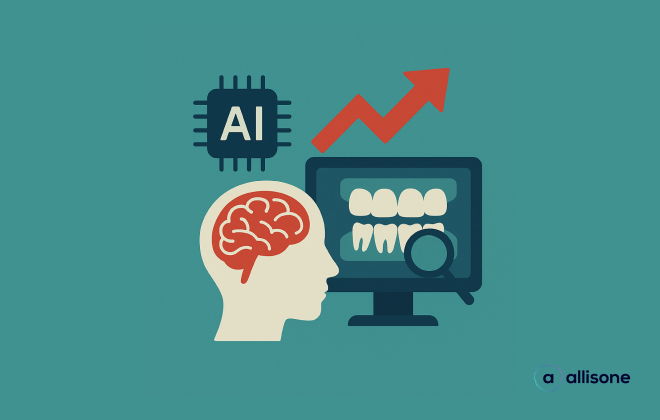
Diagnostic assistance, literature review, robotization of surgical procedures, management of administrative tasks... Tools and applications related to Artificial Intelligence are developing at great speed and are destined to take a considerable place in the medical sector. The machine's learning capacities are growing exponentially, its potential appears almost unlimited... And some of the most eminent specialists in the field readily admit that a world where computer intelligence will surpass human intelligence is quite plausible. But should we fear that AI will replace dentists? The question deserves to be asked.
The world of dentistry is known, rightly or wrongly, to be rather resistant to change. However, for the past few years, AI-related applications have been making their way into practices and, in a subtle but nonetheless palpable way, are helping to revolutionize the profession of dental practice.
Tools that boost dentists' intelligence and performance
Although France is not yet ready to integrate Yomi, the Chinese robot capable of adjusting two implants on a patient in just one hour, increasingly efficient tools are already providing many services to leading professionals.
Among the most popular applications, we find software that allows to obtain, in a few seconds, a fine and reliable reading of a digital image.
A diagnostic aid that not only simplifies the dental practitioner's task but also allows him togo further in his analysis and refine the treatment plan proposed to his patient. The machine supports the practitioner, becomes his right hand and increases his productivity. The result: peace of mind and significant time savings at each consultation, which allows the practitioner to be more available to discuss with his patient who is eager for information and advice.
The machine will never replace the human capacity for empathy
And if the machine, whatever its function, is endowed with seemingly unlimited and a priori infallible capacities, it lacks an option that only human beings have: empathy. And, as we know, emotional intelligence, the ability to put oneself in the place of the other, to understand and understand him or her, is essential to provide quality personalized care. If patients expect their dentist to have real technical expertise, they also need to feel confident and reassured. Perhaps even more so than when they go to another health specialist: the oral sphere is considered particularly intimate and stomatophobia, although clearly decreasing in recent years, is still a reality for many patients.
AI solutions, a guarantee of progress for practitioners and patients
Certainly, the gradual but unavoidable entry of AI tools into dental practices will profoundly modify dental practice. The training of dental students must be adapted to these new practices and allow today's and tomorrow's dental practitioners to acquire the fundamental practices and knowledge, particularly those related to biotechnologies.
But far from scaring people and pushing them towards an outrageous and deleterious robotization for a profession and its patients, the diffusion of new AI solutions must be considered as a guarantee of progress. The tools that support the practice of professionals will continue to contribute to medical advances, to the improvement of the quality of life at work, but also to the patient experience . Undoubtedly, the latter is progressing thanks to technological solutions, but it could not exist without a human being watching over the human...
Articles en lien
Lorem ipsum dolor sit amet, consectetur adipiscing elit.

Comment l’intelligence artificielle optimise le diagnostic médical et la compréhension patients

L'avenir des cabinets dentaires : intelligence artificielle et gestion connectée au service des praticiens






